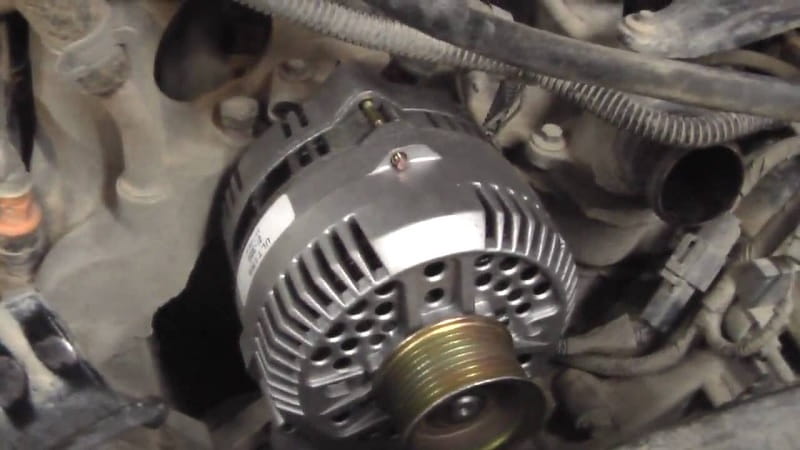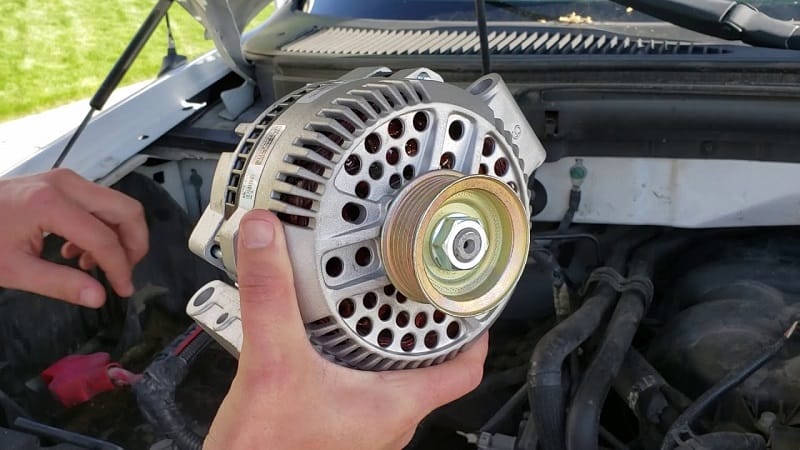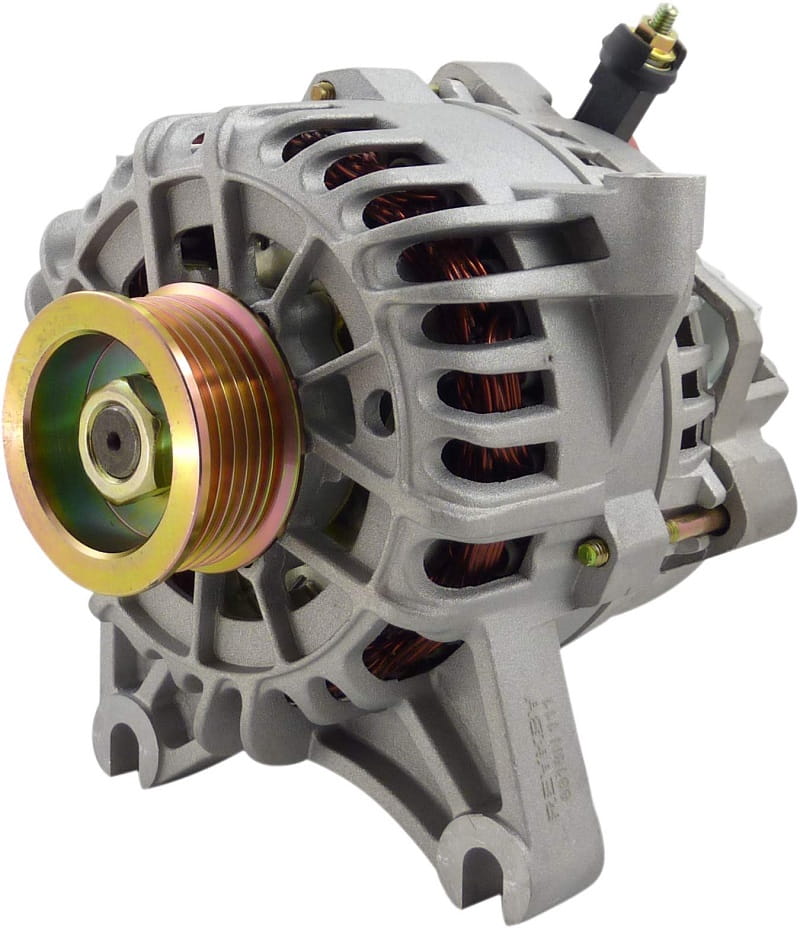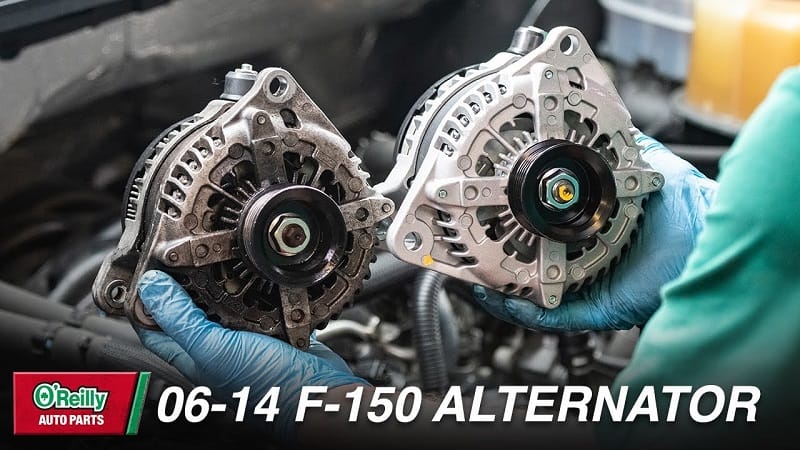This post contains affiliate links. This means I will make a commission at no extra cost to you should you click through and make a purchase [ “As an Amazon Associate, I earn from qualifying purchases.” ]. Read the full disclosure here.
Alternator for a Ford F150 GuideMechanic.Com When it comes to maintaining and upgrading your Ford F150, one crucial component that often goes overlooked is the alternator.
A reliable alternator ensures a steady flow of power to your vehicle’s electrical system, preventing breakdowns and ensuring optimal performance.
However, with the multitude of options available in the market, finding the right alternator for your F150 can be a daunting task.
But worry not, as this comprehensive guide will walk you through everything you need to know about selecting the perfect alternator for your Ford F150.
In this article, we will provide you with detailed insights into the various factors that should be considered before purchasing an alternator for your Ford F150.
From understanding the different types of alternators to determining the correct amperage and voltage requirements, we’ve got you covered.
Additionally, we will explore the top alternator brands known for their reliability and performance. By the end of this guide, you will have all the knowledge necessary to make an informed decision and ensure your Ford F150 functions at its best.
Alternator for a Ford F150 [ Understanding the Basics ]

In this section, we will explain the fundamental role of an alternator in your Ford F150’s electrical system. Understanding its function and components will provide you with a solid foundation for making the right choice.
What is an Alternator?
An alternator is a device responsible for converting mechanical energy from the engine into electrical energy. It plays a crucial role in supplying power to various electrical components in your Ford F150, such as the lights, ignition system, and electronic accessories. Unlike the older generators, alternators provide a more reliable and efficient power supply.
Components of an Alternator
An alternator consists of several key components, each playing a vital role in its operation. The main components include:
- Rotor: The rotor is the rotating part of the alternator that is driven by the engine’s crankshaft. It consists of a coil and a magnetic field, and as it spins, it induces an alternating current (AC) in the stator.
- Stator: The stator is a stationary component surrounding the rotor. It consists of multiple coils that generate the electrical output when the magnetic field from the rotor passes through them.
- Diode Bridge: The diode bridge is responsible for converting the alternating current produced by the stator into direct current (DC). It ensures that the electrical output from the alternator is consistent and suitable for charging the battery and powering the vehicle’s electrical system.
- Voltage Regulator: The voltage regulator controls the output voltage of the alternator, ensuring it remains within the desired range. It also regulates the amount of current supplied to the electrical system and prevents overcharging of the battery.
How Does an Alternator Work?
Understanding how an alternator works will help you appreciate its role in your Ford F150’s electrical system. When the engine is running, the alternator’s rotor spins, creating a rotating magnetic field.
As this magnetic field passes through the stator’s coils, it induces an alternating current. The diode bridge then converts this AC into DC, which is used to charge the battery and power the various electrical components in your vehicle.
See Also: Mustang Catalytic Converter: Importance of Choosing the Right
The voltage regulator ensures that the output voltage remains stable, adjusting the field current in the rotor to maintain a consistent charge.
This process allows the alternator to meet the electrical demands of your Ford F150 while efficiently charging the battery.
Types of Alternators for Ford F150

Here, we will delve into the different types of alternators available for your Ford F150, including OEM alternators, remanufactured alternators, and aftermarket alternators. Each type has its own pros and cons, and we will help you determine which one suits your needs best.
OEM Alternators
OEM (Original Equipment Manufacturer) alternators are the ones that come directly from Ford or a Ford-approved supplier.
These alternators are designed to match the specifications and performance of the original alternator installed in your Ford F150.
They are considered the most reliable and ensure a perfect fit, making them an excellent choice for those who prefer the utmost quality and authenticity.
One of the advantages of OEM alternators is that they often come with a warranty directly from Ford. This warranty provides peace of mind, knowing that any defects or issues with the alternator will be covered by the manufacturer.
However, OEM alternators tend to be more expensive compared to other options, primarily due to their brand reputation and guaranteed quality.
Remanufactured Alternators
Remanufactured alternators are previously used alternators that have been thoroughly inspected, repaired, and restored to their original working condition.
These alternators undergo a rigorous refurbishment process, including replacing faulty components, cleaning, and testing, ensuring their reliability and performance.
Remanufactured alternators are often a more cost-effective option compared to OEM alternators, providing similar quality at a lower price point.
When purchasing a remanufactured alternator, it’s essential to choose a reputable supplier that follows strict quality control measures.
Look for suppliers that offer warranties to ensure that you have recourse if any issues arise. While remanufactured alternators may not have the same brand recognition as OEM alternators, they can be an excellent choice for those seeking reliable performance without breaking the bank.
Aftermarket Alternators
Aftermarket alternators are produced by third-party manufacturers and are not affiliated with Ford or its approved suppliers.
These alternators are often designed to meet or exceed the specifications of OEM alternators while offering additional features or improved performance.
Aftermarket alternators are typically available in a wide range of options, allowing you to choose based on your specific needs and budget.
One advantage of aftermarket alternators is their competitive pricing. Since they are not associated with the brand name, aftermarket alternators tend to be more affordable compared to OEM or remanufactured alternators.
However, it’s crucial to research and choose a reputable aftermarket brand that has a proven track record of reliability and customer satisfaction.
Reading reviews and seeking recommendations from trusted sources can help you identify reliable aftermarket alternator options for your Ford F150.
Determining the Correct Amperage and Voltage Requirements

To ensure your Ford F150 receives the appropriate power supply, you need to understand the amperage and voltage requirements. This section will guide you in calculating and determining the ideal specifications for your alternator.
Understanding Amperage and Voltage
Amperage and voltage are two crucial factors to consider when choosing an alternator for your Ford F150. Amperage refers to the amount of current an alternator can produce, while voltage represents the electrical pressure or potential difference.
Both of these factors directly impact the performance of the alternator and its ability to meet the electrical demands of your vehicle.
Calculating Amperage Requirements
Calculating the amperage requirements for your Ford F150 involves considering the electrical load of your vehicle, which includes all the electrical components and accessories that draw power from the alternator.
Some common electrical components that consume power include the lights, air conditioning system, stereo, and additional aftermarket accessories like winches or light bars.
To determine the total amperage requirements, you can refer to the electrical specifications provided by your vehicle manufacturer or consult an automotive electrician.
It’s crucial to consider both the continuous and peak amperage requirements to ensure the alternator can handle sudden spikes in demand without overloading.
Once you have determined the amperage requirements, it is generally recommended to choose an alternator that provides slightly more amperage than your calculated needs. This ensures that your alternator operates within its capacity and prevents any strain or overheating.
Ensuring Proper Voltage Output
The voltage output of an alternator is equally important, as it needs to match the electrical requirements of your Ford F150. Most modern vehicles, including the Ford F150, operate on a 12-volt electrical system.
Therefore, it is essential to select an alternator that provides a consistent output voltage of around 14 volts to effectively charge the battery and power the electrical components.
When choosing an alternator, ensure that it has a built-in voltage regulator or is compatible with an external voltage regulator to maintain a stable output voltage.
This helps prevent overcharging or undercharging of the battery, which can lead to premature battery failure or insufficient power supply to the electrical system.
Alternator for a Ford F150 [ Choosing the Right Alternator Brand ]
Not all alternator brands are created equal. In this section, we will review some of the top alternator brands known for their quality, durability, and performance. By considering these reputable brands, you can ensure that you invest in a reliable alternator for your Ford F150.
Brand Reputation and Reliability
When selecting an alternator for your Ford F150, it’s crucial to consider the reputation and reliability of the brand. Opting for well-established brands that have a proven track record of producing high-quality alternators can give you confidence in your purchase. These brands have likely invested in research and development, ensuring their alternators meet or exceed industry standards.
Some renowned alternator brands in theindustry include Bosch, Denso, Delco Remy, and AC Delco. These brands are known for their commitment to quality and have built a solid reputation over the years.
By choosing alternators from reputable brands, you can have peace of mind knowing that you are investing in a reliable and durable product.
Customer Reviews and Feedback
In addition to considering the reputation of the brand, it’s also essential to take into account customer reviews and feedback.
Reading reviews from other Ford F150 owners who have purchased alternators from a particular brand can provide valuable insights into the performance and reliability of their products.
Look for reviews that mention the longevity of the alternator, its ability to handle electrical loads, and the customer service provided by the brand.
Positive reviews and high ratings indicate that the brand is delivering on its promises and satisfying customers’ needs. However, it’s important to be discerning when reading reviews and consider both positive and negative feedback to make an informed decision.
Warranty and Customer Support
Another crucial factor to consider when choosing an alternator brand is the warranty and customer support offered. A solid warranty demonstrates the brand’s confidence in the quality and reliability of their product.
It provides assurance that if any issues arise within the warranty period, you can have the alternator repaired or replaced at no additional cost.
Additionally, consider the availability and responsiveness of customer support. A brand that provides excellent customer service and support can be invaluable if you have any questions or concerns regarding your alternator.
Look for brands that offer easily accessible customer support channels, such as phone, email, or online chat, to address any queries or issues promptly.
Alternator for a Ford F150 [ Factors to Consider: Warranty and Price ]
When purchasing an alternator, it’s crucial to consider the warranty offered and the price range. We will discuss how to balance these factors effectively to ensure you get the best value for your money without compromising on quality.
Importance of Warranty
A warranty provides protection and peace of mind, ensuring that you are covered in case of any defects or issues with the alternator.
It is essential to carefully review the warranty terms offered by the manufacturer or supplier to understand what is covered and for how long.
Consider the duration of the warranty, as well as any conditions or limitations. Some warranties may have specific requirements, such as regular maintenance or installation by a certified technician, to remain valid.
Understanding the warranty terms will help you assess the level of support you can expect and make an informed decision.
Price Range and Value for Money
Price is an important factor when choosing an alternator; however, it should not be the sole determining factor. While it may be tempting to opt for the cheapest option available, it’s essential to consider the overall value for money.
Consider the quality, reliability, and reputation of the brand, as well as the warranty and customer support offered. A slightly higher-priced alternator from a reputable brand with a longer warranty and excellent customer support may provide better value in the long run compared to a cheaper alternative with limited warranty coverage.
It’s also worth considering the potential costs of an alternator failure. A low-quality alternator that fails prematurely can lead to additional expenses for repairs, replacements, and potential damage to other electrical components in your Ford F150. Therefore, investing in a reliable alternator from a trusted brand can save you money and headaches in the long term.
DIY Installation Tips and Precautions
If you’re planning to install the alternator yourself, this section will provide you with step-by-step instructions and essential precautions to ensure a successful and safe installation.
Preparation and Safety Precautions
Before beginning the alternator installation process, it’s crucial to gather all the necessary tools and materials. Refer to your Ford F150’s service manual or online resources for specific instructions and precautions related to your vehicle’s model and year.
Ensure that you have a well-lit and clean workspace to work in, preferably with a flat surface. Taking safety precautions, such as wearing gloves and safety glasses, can protect you from potential hazards during the installation process.
Step-by-Step Installation Guide
While the exact installation process may vary depending on your Ford F150’s model and year, the general steps involved in installing an alternator are as follows:
- Disconnect the negative terminal of the battery to prevent electrical shocks or damage.
- Locate the alternator, which is typically located near the front of the engine.
- Remove the drive belt or serpentine belt that is connected to the alternator by loosening the tensioner pulley.
- Disconnect the electrical connections attached to the alternator, including the main power wire and any sensor wires.
- Remove any mounting bolts or brackets securing the alternator to the engine.
- Carefully remove the old alternator from the engine compartment.
- Position the new alternator in place and secure it with the mounting bolts or brackets.
- Reconnect the electrical connections to the new alternator, ensuring they are properly secured.
- Reinstall the drive belt or serpentine belt, making sure it is properly tensioned.
- Double-check all connections and ensure everything is properly tightened.
- Reconnect the negative terminal of the battery.
It is recommended to consult your vehicle’s service manual or seek assistance from a professional if you are unsure about any step of the installation process. Following the appropriate steps and precautions will help ensure a successful alternator installation.
Signs of a Failing Alternator
Knowing the telltale signs of a failing alternator can help you address issues before they become major problems. We will outline the common symptoms that indicate your alternator needs attention.
Dimming or Flickering Lights
One of the most common signs of a failing alternator is dimming or flickering lights. If you notice that your headlights, dashboard lights, or interior lights are dimmer than usual or flicker intermittently, it could indicate a problem with your alternator.
The alternator’s inability to provide a consistent power supply can cause fluctuations in the electrical system, resulting in dim or flickering lights.
Strange Noises
A failing alternator may produce unusual noises, such as grinding, whining, or squealing sounds. These noises can indicate worn-out bearings or other internal components within the alternator.
If you notice any abnormal noises coming from the engine compartment, it’s important to have your alternator inspected and repaired or replaced if necessary.
Battery-Related Issues
The alternator plays a crucial role in charging the battery while the engine is running. Therefore, a failing alternator can lead to various battery-related issues.
If you experience frequent battery drain or find that your battery is unable to hold a charge even after being jump-started, it could be a sign of alternator failure.
Additionally, a dashboard warning light, such as the battery or charging system warning light, illuminating can indicate an issue with the alternator.
Electrical System Malfunctions
A failing alternator can result in various electrical system malfunctions in your Ford F150. These may include issues with the power windows, power locks, radio, air conditioning, or other electronic accessories.
If you notice that these components are not functioning properly or are experiencing intermittent failures, it’s worth getting your alternator inspected.
Maintenance Tips to Prolong Alternator Lifespan
In this section, we will provide you with essential maintenance tips to extend the lifespan of your alternator. By following these guidelines, you can ensure that your alternator operates optimally and avoids premature failure.
Regular Inspection and Cleaning
Performing regular inspections of your alternator can help identify any signs of wear or damage. Look for loose connections, frayed wires, or any visual indications of component failure.
Clean the alternator and its surrounding area regularly to prevent the accumulation of dirt, debris, or corrosion, which can affect its performance.
When cleaning the alternator, avoid using excessive water or harsh chemicals, as they can damage the electrical components. Instead, use a soft brush or compressed air to remove any dirt or debris.
If you notice significant corrosion or damage, it is advisable to consult a professional or replace the alternator if necessary.
Ensure Proper Belt Tension
The drive belt or serpentine belt that connects the alternator to the engine plays a crucial role in transferring power. Over time, the belt may become loose or worn, affecting the alternator’s performance.
Regularly inspect the belt for signs of wear, cracks, or fraying. Additionally, ensure that the belt is properly tensioned according to the manufacturer’s specifications. A loose or worn belt should be replaced promptly to avoid slippage and potential damage to the alternator.
Keep Battery Connections Clean
Corrosion or loose connections at the battery terminals can disrupt the flow of electricity between the alternator and the battery.
Regularly inspect the battery terminals and clean them if you notice any corrosion. Use a battery terminal cleaner or a mixture of baking soda and water to remove any buildup.
Monitor Electrical Load
Monitoring the electrical load of your Ford F150 can help prevent excessive strain on the alternator. Avoid overloading the electrical system with aftermarket accessories or modifications that draw excessive power.
If you plan to install additional electrical components, ensure that your alternator has the capacity to handle the increased load.
Distribute the electrical load evenly and consider using relays or separate circuits for high-power devices to prevent overtaxing the alternator.
Regular Battery Maintenance
Proper battery maintenance is crucial for the optimal performance of your alternator. Ensure that the battery is securely mounted and the terminals are clean and free from corrosion.
Check the battery’s water level if it is a non-sealed battery, and top it up with distilled water if necessary. A healthy battery that is properly maintained will reduce the strain on the alternator and prolong its lifespan.
Avoid Excessive Idling
Excessive idling can put unnecessary strain on the alternator as it needs to provide power without the engine running at higher speeds.
If you find yourself frequently idling for extended periods, consider turning off the engine if it is safe to do so. Minimize unnecessary idling to reduce the workload on the alternator and promote its longevity.
Regular Professional Inspections
While regular maintenance can help prolong the lifespan of your alternator, it is advisable to have it professionally inspected at regular intervals.
A qualified technician can perform more in-depth tests and diagnostics to detect any underlying issues or potential problems.
They can also ensure that the alternator is operating within its specified parameters and make any necessary adjustments or repairs.
Frequently Asked Questions (FAQs)
Here, we will address some of the most commonly asked questions about alternators for Ford F150. Whether you have inquiries regarding compatibility, installation, or troubleshooting, you’ll find the answers you need.
Q: How do I determine if the alternator is compatible with my Ford F150?
A: To determine compatibility, you need to consider the alternator’s specifications, such as its amperage and voltage output.
Refer to your Ford F150’s service manual or consult with a trusted automotive professional to ensure that the alternator you choose matches the electrical requirements of your specific model and year.
Q: Can I replace my alternator with a higher-amp alternator?
A: While it may be tempting to upgrade to a higher-amp alternator for increased power output, it is essential to ensure that your vehicle’s electrical system can handle the additional load.
Upgrading to a higher-amp alternator without considering the electrical capacity of your F150 may lead to damage to other electrical components or even pose a safety hazard.
Consult with an automotive electrician or a trusted professional to determine if a higher-amp alternator is compatible and advisable for your specific vehicle.
Q: Can I install an alternator myself, or should I seek professional help?
A: The installation of an alternator can vary depending on the vehicle’s model and year, as well as your level of experience and expertise.
While some individuals may have the necessary skills and tools to perform the installation themselves, others may prefer to seek professional help to ensure a proper and safe installation.
If you are unsure about any aspect of the installation process, it is recommended to consult a professional automotive technician to avoid any potential issues or complications.
Q: How long does an alternator typically last?
A: The lifespan of an alternator can vary depending on several factors, including the brand, quality, usage patterns, and maintenance. On average, a well-maintained alternator can last between 80,000 to 150,000 miles.
However, it’s important to note that alternators can fail prematurely due to various factors, such as manufacturing defects or extreme operating conditions.
Regular inspections, maintenance, and prompt addressing of any issues can help maximize the lifespan of your alternator.
Expert Recommendations: Best Alternators for Ford F150
Based on extensive research and customer reviews, we will present our top picks for the best alternators tailored specifically for Ford F150 trucks. These recommendations will help you narrow down your options and make a confident decision.
Bosch Premium Alternator
Bosch is a reputable brand known for its quality automotive components, and their premium alternators are no exception.
These alternators are built to meet or exceed OEM specifications, providing reliable performance and durability. With excellent reviews and a solid warranty, the Bosch Premium Alternator is a top choice for Ford F150 owners seeking a dependable alternator.
Denso Remanufactured Alternator
Denso is another trusted brand in the automotive industry, offering remanufactured alternators that provide excellent value for money.
These alternators undergo a rigorous refurbishment process and are thoroughly tested to ensure reliable performance. With a reputation for quality and customer satisfaction, Denso remanufactured alternators are a popular choice for Ford F150 owners looking for a cost-effective yet reliable option.
AC Delco Professional Alternator
AC Delco is a well-known brand that has been supplying automotive components for decades. Their professional alternators are built to deliver consistent performance and durability, making them a reliable choice for Ford F150 owners.
With a wide range of options to suit different electrical requirements and excellent customer reviews, AC Delco professional alternators are worth considering for your Ford F150.
In conclusion, choosing the right alternator for your Ford F150 is crucial to ensure optimal performance and prevent electrical system issues.
By understanding the basics of alternators, considering the different types available, determining the correct amperage and voltage requirements, and evaluating reputable brands, you can make an informed decision.
Proper installation, regular maintenance, and keeping an eye out for signs of alternator failure will help maximize the lifespan of your alternator and ensure a reliable power supply for your Ford F150.
- Food Trucks for Sale in Las Vegas NV - July 4, 2025
- Food Trucks for Sale Near Me Ready to Use - July 3, 2025
- Used Food Trucks for Sale in New York - July 3, 2025

